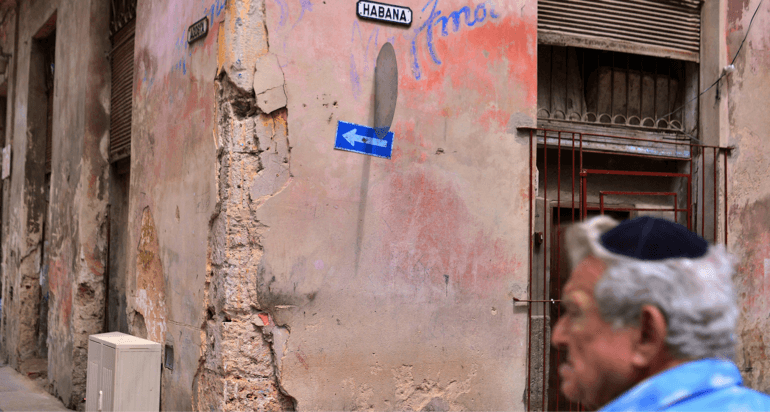
Cuba Can Be Your Next Kosher Vacation Destination
From Château Blanc on the political situation: Cuba is always a controversial subject, and we understand and respect the strong feelings that many people have about it. We ourselves are an apolitical entity that only hopes to help local Cubans and Jews manage through the difficult times today and pave a path to prosperity for the future. The Cuba we know today is changing slowly and we hope that both the Cuban and American governments will come together to find common grounf for the benefit of the people.
From JITC: Our goal is writing this article is not to promote a communist dictatorship but rather to support the local Jewish community. As the option to travel to Cuba has become available in the last several years to the general public, we wanted observant Jews to know that it is now an option for them as well.
Are you dreaming about travel or planning for Yeshiva Break? Kosher food, minyanim and more are now available in a place where so many people once thought them impossible. Cuba is a new kosher travel destination sure to combine centuries of history, Caribbean charm and a mix of tropical and city exploration that will delight families of diverse ages and backgrounds. Saul Berenthal was born and raised in Cuba by European parents and recently returned there to become the proprietor of P2P, a Cuba-only travel agency as well as the kosher B&B boutique hotel, Chateau Blanc. Growing up, he says, “I got to understand the Cuban culture and the Jewish culture at the same time.” He is passionate about driving the Cuban economy and empowering its people, particularly its Jewish community.
Berenthal graduated yeshiva and then went to military school in Cuba. The Cuba of his childhood is different than it is today. “The community was mostly merchants that immigrated from Europe after the wars…there was a real established Jewish community in Cuba.” With up to 18,000 Jews and three synagogues (one for Sephardim, one for Ashkenazim and one for the Orthodox community) there was a robust network. He was raised in both the Ashkenazi and Orthodox communities. “Even though there were three separate synagogues, we all socialized together.” Jewish merchants were prospering in the 1950s due to tourism. “We existed in a place that was a real paradise.” But then the revolution happened. Fidel Castro and the influence of the mafia at the time changed the landscape. Knowing that merchants had no future, the Jews left in droves between 1960-63. Now there are just 800-1200 Jews there.
During the 1960s to 1990s, Judaism was not illegal in Cuba, but “was not looked upon as the right thing to do.” However, with the collapse of the Soviet Union, Cuba needed a different approach to bring in money. Religious activities opened up, as did tourism. “Today [tourism] is one of the biggest industries in Cuba.” Because of this “Judaism revived in Cuba again…the synagogues are open. Now people can actually go and participate in activities. Mostly, they are social activities. There is no such thing as a rabbi in Cuba.” While people lead services, the Orthodox shul just has a cantor and visiting rabbis, even Chabad is not there officially. “Even the other Jews do not recognize them as an official entity. This is something that we are working on [fixing].”
From a tranquility point of view, Cuba is a very safe place. The government makes every effort to make sure there is no crime. “It’s not within the Cuban culture to have that.” From the perspective of traveling under the embargo, the restrictions have changed. Travel to Havana is allowed, as is staying at Chateau Blanc, which is a private sector entity and not a government-controlled place to stay, which is still restricted. The culture of Cuba in terms of music, dance, rum, cigars and more is a unique draw. There are beaches, sunshine and a culture of European tradition. “It makes it different from any other island where you could go to the beach and suntan. There’s a tremendous amount of art, a tremendous amount of tradition, a tremendous amount of architecture.”
Since they opened two years ago, P2P has brought a few dozen groups of a few dozen people. “We like to have smaller groups so we can handle the itinerary better.” They aim to “bring Jewish people so that the Jewish community of Cuba has the ability to feel that they’re not alone and abandoned.” Many of the groups bring donations to the synagogues as well. Berenthal hopes that the community will feel that, “they have brethren outside of Cuba that care about them.” Much of the community speaks English and Yiddish in addition to Spanish. Tourists come from Europe and South America as well. “Its a combination of enjoyment of Cuba and all its offerings, as well as visiting the Jewish community.”
In terms of kashrus, they have all the facilities and bring mashgichim with them, along with any needed ingredients from the United States. “Right now, most of the flights are coming out of Miami (a 45 minute flight) and Fort Lauderdale.” They hope to renew flights from Newark (2 hours) and Los Angeles soon as well, among other places. Tours last 5-7 days or up to 10 days. “We take them through art, Hemingway, tobacco country.” They ride horses go to the famous beaches, they pack lunch and dinners to take with them to these places. “We take them to visit artists in Cuba, art galleries, to the Tropicana,” the famous Cuban nightclub. Shabbos programming is available as well. “Chateau Blanc is the first and only kosher establishment in Cuba, to offer Orthodox Jewish groups, who have until now not been able to explore Cuba, a safe, legally compliant, Kosher and memorable travel experience.”
Berenthal is proud to be an ambassador to the country and community in which he grew up, as well as a provider of unique experiences to observant Jews from around the world. He hopes that if they can show people that “it’s a safe place, its a good place and they can help the Jewish community, it will grow. We are looking forward for growing the opportunity for Jews to go to Cuba.”
For more information, visit http://cubajudaism.org/, http://p2p-llc.com/ and http://chateau-cuba.com.
If you found this content meaningful and want to help further our mission through our Keter, Makom, and Tikun branches, please consider becoming a Change Maker today.







